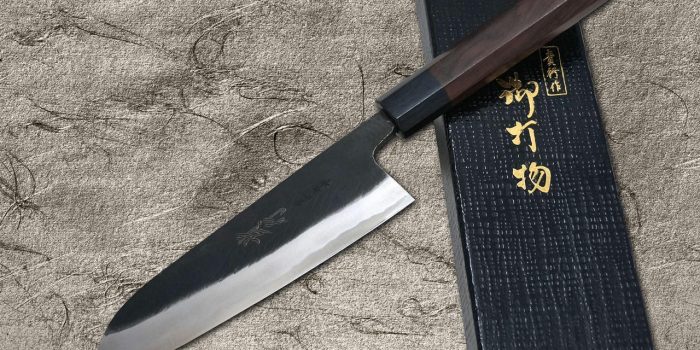img by : https://www.hocho-knife.com/
Japan has a long-standing tradition of creating exquisite handcrafted tools, and when it comes to knives, it is no exception. Among the pantheon of legendary Japanese knife makers, Takayuki Iwai stands out with his dedication to crafting exceptional blades. One of the most popular and versatile knives he produces is the Gyuto knife.
The Legacy of Takayuki Iwai
Takayuki Iwai is one of the revered blacksmiths from the famed knife-making region of Echizen in Japan. This region has an impressive history, spanning over seven centuries, in forging blades. Iwai-san, as he is respectfully known, continues this rich tradition, merging time-honored techniques with modern refinements.
His commitment to perfection and attention to detail are evident in every blade he crafts. By maintaining the balance between the blade’s sharpness and flexibility, Iwai knives ensure durability while preserving the delicacy needed for precise cuts.
The Gyuto Knife
The Gyuto, translating to “cow sword,” is often compared to the Western chef’s knife. But it carries distinct features that set it apart:
Shape:
Gyutos have a slimmer profile with a sharper edge. This design aids in cleaner, more efficient slicing and dicing.
Blade Hardness:
Japanese knives, including the Gyuto, often employ harder steel. This ensures the edge’s sharpness lasts longer, although it might make the blade a bit more brittle than its Western counterparts.
Versatility:
The Gyuto knife is ideal for a range of tasks in the kitchen. Whether it’s slicing fish, chopping vegetables, or mincing herbs, its design ensures optimum performance.
Craftsmanship:
The beauty of a Gyuto knife, especially one crafted by Takayuki Iwai, is in its craftsmanship. The aesthetics of the blade, combined with its functionality, make it a work of art. Many of these knives feature a unique Damascus pattern, reflecting the layers of steel forged together.
Caring for Your Takayuki Iwai Gyuto
To preserve the beauty and functionality of your Gyuto knife, consider the following care tips:
Sharpening:
Use a high-quality whetstone to maintain the blade’s edge. Regular honing will also help keep it sharp.
Cleaning:
Always hand-wash your Gyuto knife with mild soap and water. Avoid abrasive scrubbers and never place it in a dishwasher.
Storage:
Store your knife in a wooden block or magnetic strip to prevent damage to its edge.
Handling:
Always use the knife with respect and care. Its sharpness is unmatched, and mishandling can lead to accidents.
In conclusion, the Gyuto knife by Takayuki Iwai represents a seamless blend of tradition and innovation. It’s a testament to the meticulous craftsmanship that Japanese blacksmiths, especially from the Echizen region, are celebrated for. Owning one of these knives is not just about having a kitchen tool; it’s about possessing a piece of Japanese heritage.

